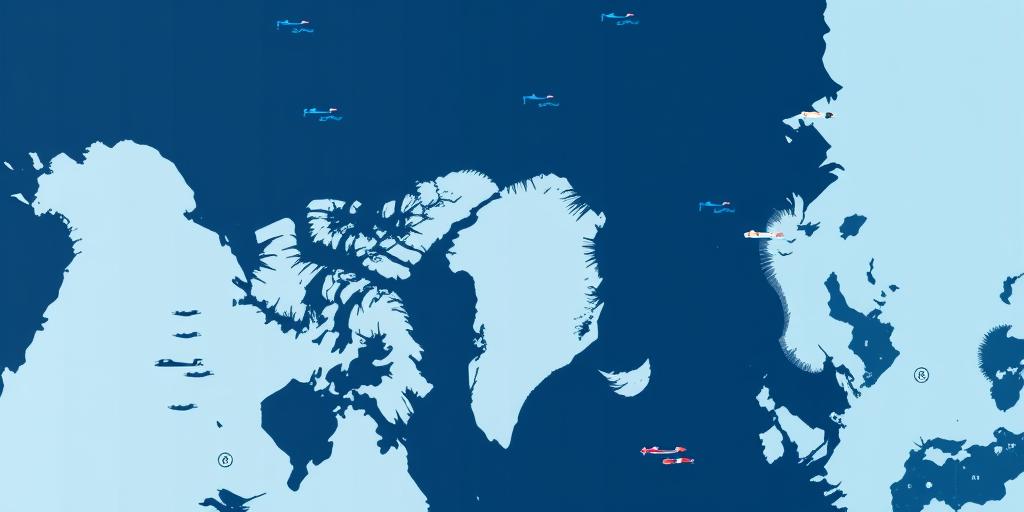Geopolitical Challenges in the Arctic
The Arctic, once a remote and largely inaccessible region, is rapidly emerging as a focal point of geopolitical competition. Several factors contribute to this increasing strategic importance, including climate change, resource availability, and evolving geopolitical strategies. This article examines the key challenges and dynamics shaping the Arctic's geopolitical landscape.
Climate Change and Increased Accessibility
The most significant driver of change in the Arctic is climate change. Rising global temperatures are causing sea ice to melt at an unprecedented rate, opening up new shipping routes and access to previously inaccessible areas. The Northern Sea Route (NSR) along Russia's Arctic coast and the Northwest Passage through the Canadian Arctic Archipelago are becoming increasingly viable for commercial shipping, potentially shortening transit times between Europe and Asia. This increased accessibility has profound implications for trade, security, and resource exploitation.
Resource Competition
The Arctic is estimated to hold vast reserves of untapped natural resources, including oil, natural gas, minerals, and fish stocks. As sea ice retreats, these resources become more accessible, leading to increased competition among nations seeking to secure their energy and resource needs. The scramble for Arctic resources has the potential to exacerbate tensions and create new conflicts in the region.
Military Presence and Security Concerns
The Arctic's strategic importance is also growing due to its proximity to major powers and its potential as a transit route for military assets. Several countries, including Russia, the United States, Canada, and Denmark (Greenland), have increased their military presence in the Arctic, conducting exercises, building new bases, and deploying advanced military technologies. This militarization of the Arctic raises concerns about the potential for miscalculation, escalation, and conflict.
Sovereignty Disputes and Border Issues
Several unresolved sovereignty disputes and border issues further complicate the Arctic's geopolitical landscape. For example, the Lomonosov Ridge, an underwater mountain range that stretches across the Arctic Ocean, is claimed by Russia, Canada, and Denmark as an extension of their continental shelves. These overlapping claims create uncertainty and the potential for disputes over resource rights and maritime boundaries.
International Governance and Cooperation
The Arctic Council, an intergovernmental forum consisting of the eight Arctic states (Canada, Denmark, Finland, Iceland, Norway, Russia, Sweden, and the United States), plays a crucial role in promoting cooperation and addressing common challenges in the region. However, the Arctic Council's mandate is limited, and it lacks the authority to enforce its decisions or resolve disputes. Other international legal frameworks, such as the United Nations Convention on the Law of the Sea (UNCLOS), also apply to the Arctic, but their interpretation and application remain contested.
Russia's Arctic Ambitions
Russia has been the most assertive in pursuing its interests in the Arctic, investing heavily in military infrastructure, resource extraction, and shipping infrastructure along its Arctic coast. Russia views the Arctic as a vital strategic asset and is determined to maintain its dominance in the region. This has led to increased tensions with other Arctic states, particularly the United States and Canada.
The Role of Non-Arctic States
Non-Arctic states, such as China, are also increasingly interested in the Arctic, seeking to participate in resource development, shipping, and scientific research. China has declared itself a "near-Arctic state" and has invested heavily in Arctic infrastructure projects, raising concerns about its long-term strategic goals in the region.
Environmental Concerns and Sustainable Development
The Arctic is a fragile ecosystem that is particularly vulnerable to the impacts of climate change and human activities. Increased shipping, resource extraction, and military activities pose significant risks to the Arctic environment, including pollution, habitat destruction, and disruption of wildlife populations. Balancing economic development with environmental protection is a critical challenge for Arctic states.
Conclusion
The Arctic is undergoing a period of rapid transformation, driven by climate change, resource competition, and geopolitical rivalries. Addressing the challenges in the Arctic requires international cooperation, respect for international law, and a commitment to sustainable development. Failure to do so could lead to increased tensions, environmental degradation, and conflict in this strategically important region.









